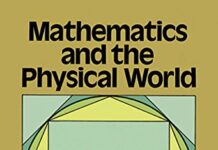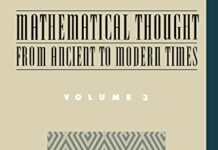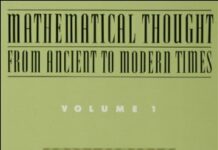
Ebook Info
- Published: 1982
- Number of pages: 384 pages
- Format: PDF
- File Size: 25.16 MB
- Authors: Morris Kline
Description
Refuting the accepted belief that mathematics is exact and infallible, the author examines the development of conflicting concepts of mathematics and their implications for the physical, applied, social, and computer sciences
User’s Reviews
Editorial Reviews: From the Back Cover Most intelligent people today still believe that mathematics is a body of unshakable truths about the physical world and that mathematical reasoning is exact and infallible. Mathematics: The Loss of Certainty refutes that myth. About the Author Morris Kline is Professor Emeritus at the Courant Institute of Mathematical Sciences, New York University.
Reviews from Amazon users which were colected at the time this book was published on the website:
⭐Preface explains: “This book treats the fundamental changes that man has been forced to make in his understanding of the nature and role of mathematics. We know today that mathematics does not possess the qualities that in the past earned for it universal respect and admiration. Mathematics was regarded as the acme of exact reasoning, a body of truths in itself, and the truth about the design of nature.” This view drives modernity.”How man came to the realization that these values are false and what our present understanding is constitute the major themes. . . . Recognition of the limitations, as well as capabilities, of reason is far more beneficial than blind trust which can lead to false ideologies and even to destruction.”Startling admission by devoted professor of math!Outstanding evidence that math is not provable truth. When explaining Pascal’s effort to prove calculus, he writes on page 134 . . .”Pascal, too, had ambivalent feelings about rigor. At times he argued that the proper “finesse” rather than geometrical logic is what is needed to do the correct thing just as the religious appreciation of Grace is above reason.”The introduction presents the profund failure of mathematics to prove itself as “truth”. Quotes Weyl, one of the greatest mathematicians of the twentieth century: ” ‘Mathematizing’ may well be a creative activity of man, like language or music, of primary originality, whose historical decisions defy complete objective rationalization.” (6)1) Genesis of Mathematical Truth2) The flowering of Mathematical Truth3) The Mathematization of Science4) The First Debacle: The Withering of Truth5) The Illogical Development of a Logical Subject6) The Illogical Development: The Morass of Analysis7) The Illogical Development: The Predicament circa 18008) The illogical Development: At the Gates of Paradise9) Paradise Barred: A New Crisis of Reason10) Logicism vs Intuitionism11) The Formalist12) Disasters13) The Isolation of Mathematics14) Whither Mathematics?15) The Authority of NatureAbout 1500 the rebirth of Greek belief in nature made from mathematics entered Europe. The scholars were devout Christians. How could they devote a life to mathematics (pagan) and the Christian God? Simple. . .”The answer was to add a new doctrine, that the Christian God had designed the universe mathematically. Thus the Catholic doctrine postulating the supreme importantance of seeking to understand God’s will and His creations took the form of a search for God’s mathematician design of nature. . . . Mathematical knowledge, the truth about God’s design of the universe, was as sacred as any line of scripture.” (35)Kline notes that the unquestioned faith in divine mathematics was essential for the flowering of mathematics at that time. Copernicus and Kepler, both deeply devout Christians, demonstrate this clearly. Their faith drove their life-long labors.Newton’s effort to justify calculus also failed. It was used and loved because was physically true, page 135, not because it could be logically proved. Why was Newton convinced mathematics is true? Newton believed God used mathematics to design the world. Newton wrote in “Opticks” -“What is there in places almost empty of matter, and whence is it the sun and planets gravitate towards one another, without dense matter between them? Whence is it that nature doth nothing in vain; and whence arises all order and beauty we see in the world? . . . How came the bodies of animals to be contrived with so much art, and for what ends were their several parts? Was the eye contrived without skill in optics, or the ear without knowledge of sounds? How do the motions of the body follow from the will, and whence is the instinct in animals? . . . And these things being rightly dispatched, does it not appear from phenomena that there is a being incorporeal, living, intelligent, omnipresent, who, in infinite space, as it were in his sensory, sees the things themselves intimately, and thoroughly perceives them.” (59)This unshakeable conviction of a mathematical designer, created unshakeable faith in mathematics.Newton and Leibniz both pursued science for the glory of God. Leibniz wrote:”It seems to me that the principal goal of the whole of mankind must be the knowledge and development of the wonders of God, and that this is the reason that God gave him the empire of the globe.” (60)Page 162, “Students of the calculus remains perplexed, and the best they could do was to follow the advice of d’Alembert : “persist and faith will come to you.””Indifference to and even dissmissal of God as the law-maker of the universe, as well as the Kantian view that the laws were inherent in the structure of the human mind, brought forth a reaction from the Divine Architect. God decided that he would punish the Kantians and especially those egotistic, proud, and overconfident mathematicians. And He proceeded to encourage non-Euclidean geometry, a creation that devastated the achievements of man’s presumably self-sufficient all-powerful reason.” (78)This new mathematics (geometry) is key to understanding modernity.Einstein’s famous comment in 1921 makes the point: “Insofar as the propositions of mathematics give an account of reality they are not certain; and insofar as they are certain they do not describe reality.” (97)Deep insight that is not well known.The dream of safe, certain, provable mathematical truth, was – well – a dream. “Mathematicians were mislead by that ‘evil genius’ Euclid.” (313)Quotes Schopenhauer: “it is necessary to demand above all that one abandon the preconception that consists in believing that demonstrated knowledge is superior to intuitive knowledge.””The concept of proof then, large as it has loomed in the public mind and in the publications of mathematicians, has not played the role commonly assumed. . . . As far back as 1928 , G. H. Hardy poke out with his usual bluntness: There is strictly no such thing as mathematical proof; we can, in the final analysis, do nothing but point. . . . Rhetorical flourishes designed to affect psychology, pictures on the board n lectures, devices to stimulate the imagination of pupils.” (314)Whitehead: “The conclusion is that Logic, conceived as an adequate analysis of the advance of thought, is a fake. . . . My point is that in the final outlook of philosophic thought cannot be based upon the exact statements which form the basis of special sciences. The exactness is false.” (315)Stunning. The modern world is lead by trust in such “false exactness”. This is “faith” without reason, not “faith” in reason.Ends by quoting Alford North Whitehead, ” “let us grant that the pursuit of mathematics is a divine madness of the human spirit.” Madness, perhaps, but surely divine.”Explains that the loss of faith in math began with the loss of faith that God is, as Galileo taught, a mathematician who used math to create the world.Perhaps trust in math will return with trust in the Creator.
⭐Renowned physicist John L. Synge wrote in 1944 that, “Our science started with mathematics and will surely end not long after mathematics is withdrawn from it …” (p. 291) Hermann Weyl, one of the greatest mathematicians of the 20th century, predicted in 1949 that “science would perish without a supporting transcendental faith in truth and reality…” (p. 348) Author Morris Kline establishes in this book that mathematicians have in fact lost their faith in transcendental truth and reality, and are now withdrawing from science in droves.Kline begins with classical Greece and writes, “Of all the triumphs of the speculative thought of the Greeks, the most truly novel was their conception of the cosmos operating in accordance with mathematical laws discoverable by human thought.” (18) Anaxagoras proclaimed that “Reason rules the world” and Plutarch reported Plato’s famous “God eternally geometrizes.” (11, 16) The great Pythagoras proceeded upon “the all-important doctrines that nature was built according to mathematical principles and that number relationships underlie, unify, and reveal the order in nature.” (15) To the Pythagoreans, “There was no question this world was mathematically structured.” (16)Following the destruction of the Greek civilization, scientific investigation of the natural world lay largely inactive until awakened from its Scholastic and Aristotelian slumber. Galileo declared, “When we have the decree of nature, authority goes for nothing.” (48) Added to the Greek concept of mathematical design in nature was identification of the designer, the Christian God. “The search for the mathematical laws of nature was an act of devotion which would reveal the glory and grandeur of His handiwork.” (34-35) Kepler’s book on planetary motion proclaimed: “Sun, moon, and all the planets glorify Him in your ineffable language! Celestial harmonies, all ye who comprehend His marvelous works, praise Him. … That which we know best is comprised in Him, as well as in our vain science.” (38-39) Sir Isaac Newton wrote, “This most beautiful system of sun, planets, and comets could only proceed from the counsel and dominion of an intelligent and powerful Being … This Being governs all things, not as the Soul of the world, but as Lord over all…” (59)The a priori conviction that God incorporated mathematical laws into the construction of the universe produced the courage and tenacity to discover and declare those truths in the face of substantial opposition. “The strength of Copernicus’s and Kepler’s conviction that God must have designed the world harmoniously and simply can be judged by the objections with which they had to contend.” (39) Their opponents included not only religious authorities but also the predominant scientific and intellectual establishment. “Only a mathematician convinced that the universe was mathematically and simply designed would have had the mental fortitude to disregard the prevailing philosophical, religious, and scientific counter-arguments and to appreciate the mathematics of such a revolutionary astronomy. Only one possessed of unshakable convictions about the importance of mathematics in the design of the universe would have dared to affirm the new theory against the mass of powerful opposition it met.” (40-41)Today’s mathematicians lack the convictions of Kepler, Copernicus and Newton, and even those of Pythagoras and Anaxagoras. While mathematicians “prefer to believe that they create the nourishment on which philosophers feed,” it was the philosophers “in the van in denying truths about the physical world.” (74) Who guarantees that there is a permanently existing world of solid objects? Hume’s skepticism gained ground among the mathematicians and stripped away the inevitability of the laws of nature, their eternality and their inviolability. We know neither mind nor matter; both are fictions. (74)”Science is rationalized fiction, rationalized by mathematics,” writes Kline. Albert Einstein emphasized the fictional character of modern science in 1931: “According to Newton’s system, physical reality is characterized by the concepts of space, time, material point, and force… After Maxwell they conceived physical reality as represented by continuous fields, not mechanically explicable, which are subject to partial differential equations. … The view I have just outlined of the purely fictitious character of the fundamentals of scientific theory was by no means the prevailing one in the eighteenth and nineteenth centuries. But it is steadily gaining ground from the fact that the distance in thought between the fundamental concepts and laws on one side and, on the other, the conclusions which have to be brought into relation with our experience grows larger and larger…” (337)Mathematics is “a human construction and any attempt to find an absolute basis for it is probably doomed to failure.” (312) Nobel physicist Percy Bridgman flatly rejected any objective world of mathematics writing in 1946, “It is the merest truism, evident at once to unsophisticated observation, that mathematics is a human invention.” (325)”Today,” Kline writes, “the belief in the mathematical design of nature seems far-fetched.” (349) There is no longer correspondence between the mathematics within man’s mind and the observable universe outside it, only an inexplicable correlation. Erwin Schrödinger said that the miracle of man’s discovering laws of nature may well be beyond human understanding, and Einstein remarked, “The most incomprehensible thing about the world is that it is comprehensible.” (349)The upshot of this post-modern skepticism is that mathematicians are abandoning applied mathematics for “pure” mathematics. Few, it seems, are willing to invest their lives and stake their reputations on the search for truths about the real world when they have no confidence that there are any truths out there to be found, or that the universe won’t arbitrarily produce some new fact that contradicts and destroys their life’s work. Safer to escape from what Henri Poincare described as the “tyranny of the external world” and retreat to the idealized realm of pure mathematics. After all, “human effort and ingenuity are limited and should therefore be devoted to good risks.” (285) Some rejoice at this development. One of Britain’s leading mathematicians, Geofrey Hardy, is reported to have made the toast: “Here’s to pure mathematics! May it never have any use”; and Leonard Dickson, an authority at the University of Chicago, used to say: “Thank God that number theory is unsullied by any applications.” (295)The thesis of Kline’s book is that the “loss of truth, the constantly increasing complexity of mathematics and science, and the uncertainty about which approach is secure have caused most mathematicians to abandon science.” (7) He states that “about ninety percent of the mathematicians active today are ignorant of science and are quite content to remain in that blissful state.” (303) Others put the percentage even higher. Distinguished professor John Slater of MIT said that for every one mathematician interested in areas of physics “there are twenty who have no interest.” (302) Leading French mathematician Laurent Schwartz said that the most active fields of mathematics have no application. (299)Returning then to John Synge’s observation that science “will surely end not long after mathematics is withdrawn from it” and Hermann Weyl’s prediction that “science would perish without a supporting transcendental faith in truth and reality,” are we to conclude that the end is near?
⭐Kline is an excellent expositor.The book can be understood by any intelligent lay person, but someone with a mathematical background will get more out of it.
⭐The writer seems to be quite pessimistic. I think the writer has lost all faith in mathematics. It seems that way though. Otherwise quite good book to know and understand the limits of maths
Keywords
Free Download Mathematics: The Loss of Certainty (Galaxy Books) in PDF format
Mathematics: The Loss of Certainty (Galaxy Books) PDF Free Download
Download Mathematics: The Loss of Certainty (Galaxy Books) 1982 PDF Free
Mathematics: The Loss of Certainty (Galaxy Books) 1982 PDF Free Download
Download Mathematics: The Loss of Certainty (Galaxy Books) PDF
Free Download Ebook Mathematics: The Loss of Certainty (Galaxy Books)




